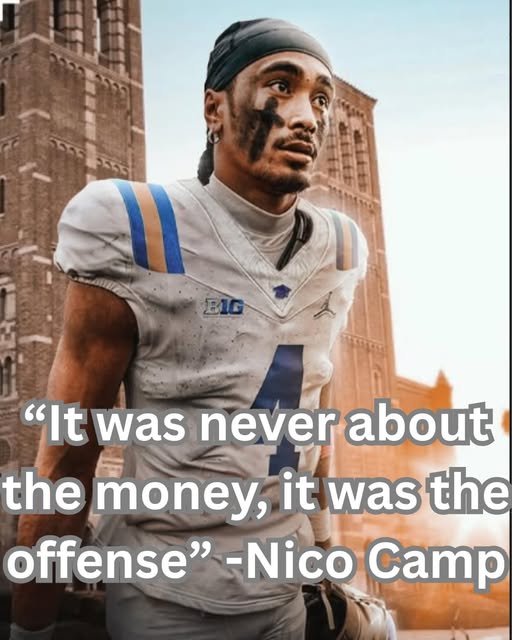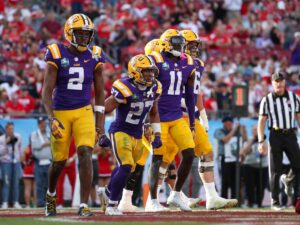
Nico’s Transfer Excuse Falls Flat: It’s Not the Offense, It’s About NIL and Convenience
When Nico Iamaleava, the highly touted quarterback, made the decision to leave Tennessee, the narrative presented was that his move was not about the money, but rather his desire to fit better within the Vols’ offensive scheme. The claim was that Tennessee’s offensive style just didn’t suit his game, and that’s why he transferred. At least, that’s the story Nico and some around him are trying to sell. But as anyone familiar with Tennessee’s high-powered offense under head coach Josh Heupel will tell you, this excuse doesn’t pass the sniff test.
In reality, it seems like the move had little to do with football systems and everything to do with other factors, namely NIL (Name, Image, and Likeness) opportunities and a preference for being closer to home. When you dive into the facts, it becomes clear that Nico’s decision was far more about external factors than any supposed dissatisfaction with Tennessee’s offensive structure, which has been one of the most dynamic in college football over the past few years.
A Quick Look at Tennessee’s Offense Under Heupel
Tennessee’s offense, under the guidance of Josh Heupel, has been an absolute juggernaut. Since Heupel arrived in 2021, the Vols have consistently been one of the most high-powered offenses in college football, averaging over 30 points per game. This is not just a fluke. The Vols have maintained their success despite significant turnover and have become a favorite among recruits because of the way the offense is structured.
One of the key aspects of Tennessee’s offense is its ability to develop quarterbacks. Take Hendon Hooker, for example. Hooker came to Tennessee after transferring from Virginia Tech, where he was largely seen as a backup with some potential. Under Heupel’s system, Hooker transformed into one of the most electric quarterbacks in college football, finishing as a Heisman candidate and later getting drafted by the NFL. The system’s focus on quick decisions, up-tempo play, and exploiting mismatches in the passing game worked wonders for him.
Additionally, Tennessee’s offensive system has been known for churning out NFL-caliber talent. Wide receivers like Jalin Hyatt, who won the Biletnikoff Award as the nation’s best receiver, are prime examples of how well the system can showcase a player’s abilities. Under Heupel, Tennessee’s offense isn’t just efficient; it has become a pipeline for the pros. So, when Nico Iamaleava claims that the offense didn’t suit his style, it raises eyebrows, to say the least.
The Real Story Behind the Transfer
Nico’s comments about Tennessee’s offense being the reason for his transfer don’t line up with the facts. The reality is that Tennessee’s offensive system isn’t the problem — it’s the fit of Nico’s game within that system. The offensive system is designed for quarterbacks who can make fast decisions and thrive in an up-tempo, high-pressure environment. It’s not built for quarterbacks who want to hold onto the ball longer and play hero ball. It requires precision and adaptability — qualities that many high-level quarterbacks can excel at, but they need to be willing to accept the structure of the system.
Nico, with all his potential, didn’t quite mesh with that style. It’s not a slight against his abilities; he’s undoubtedly talented. But his game, at least at this stage in his development, might not have been the ideal fit for Heupel’s high-speed offense. His inclination to play outside the structure of an offense that relies heavily on timing and rhythm, rather than improvisation and hero ball, could have led to frustrations. However, this isn’t an indictment of Tennessee’s system. Rather, it could be a reflection of the fact that Nico wasn’t fully ready to adapt to the demands of the system, and therefore, the “offense” excuse is just a convenient narrative.
The Power of NIL
Now, let’s talk about the real reasons Nico might have decided to transfer. In today’s college football landscape, NIL deals have become an enormous factor in recruitment and player movement. Nico, being one of the most highly ranked quarterbacks in his class, would have had access to lucrative NIL opportunities. As we’ve seen with several high-profile players, NIL deals can be incredibly persuasive in shaping decisions, both on and off the field.
Could it be that Nico transferred because of the financial potential that NIL deals in a different market offered? That’s a plausible explanation, especially when we look at his choice of destination. Nico’s new landing spot wasn’t exactly a place known for its offensive prowess or NFL talent pipeline. Yet, the opportunities off the field may have been too good to pass up. A larger market, more exposure, and possibly more significant NIL opportunities likely played a role in his decision.
This isn’t to say that Nico’s decision was entirely about the money, but NIL certainly played a factor. It’s a reality in today’s college football world. And the fact that Nico is downplaying this aspect, framing it instead as a philosophical disagreement with the offense, feels like a convenient dodge. The financial allure of NIL opportunities cannot be ignored, and while no one will openly admit that it’s a primary motivator, it’s clear that it holds significant weight in a player’s decision-making process.
The Comfort of Home
Another factor that likely influenced Nico’s decision to transfer was the desire to get closer to home. We live in an era where players are increasingly making decisions based on personal comfort and proximity to family. While playing for a top-tier program like Tennessee might be a dream for many, the reality is that moving far away from home isn’t always easy, especially for a young player.
For Nico, the idea of transferring back to a program closer to home, or at least to a place with a similar cultural feel, may have been appealing. This would allow him to be closer to his support system and family, which can be a huge factor in a player’s mental and emotional well-being. The transition from high school to college is never easy, and being far from home can add an additional layer of stress and uncertainty.
UCLA’s Struggles Under Chip Kelly
It’s also worth pointing out that the destination Nico chose — UCLA — had one of the most lackluster offenses in the Power Five conferences under Chip Kelly. For a player who supposedly transferred for “offensive fit,” one would expect him to go to a program known for offensive innovation and success. However, UCLA’s offense, while improving, had struggled in recent years. Chip Kelly’s tenure has seen more sputtering than fireworks, and his system has yet to fully hit its stride at UCLA, despite his reputation as an offensive mastermind from his time at Oregon.
UCLA’s offense is nowhere near the level of Tennessee’s system, which is designed to maximize quick decision-making, tempo, and passing game efficiency. Nico’s move to UCLA raises more questions than answers. If the offensive system at Tennessee was such a poor fit for Nico, why would he choose a program whose offensive struggles have been well documented? It seems to further undermine the argument that football reasons, especially the offense, were the real reason behind his departure.
The Transfer Market and Resetting Careers
Nico’s transfer can also be seen as part of the larger trend in college football where players, particularly quarterbacks, are constantly looking for the best fit for their careers. The transfer portal has become a mechanism for resetting careers, and for a player like Nico, the idea of being in a different system, with different coaching staff, and a fresh start might have seemed appealing.
However, there’s also a level of pragmatism at play. If he wasn’t going to be the starter at Tennessee, why not look for an opportunity where he could immediately make an impact? The pressure of being the backup to a quarterback like Joe Milton, who had already proved himself to be a capable starter, could have weighed heavily on Nico. The transfer portal provides a convenient exit for a player in search of more immediate playing time, and that could very well have been a factor in Nico’s decision to leave.
In the end, Nico Iamaleava’s excuse that his transfer was driven by dissatisfaction with Tennessee’s offense rings hollow. Tennessee’s offense, under Heupel, has been one of the most successful in the nation, with a history of developing quarterbacks and putting up impressive numbers. Nico’s decision seems far more influenced by off-the-field factors, such as NIL opportunities and the desire to be closer to home, than any legitimate issues with Tennessee’s offensive scheme.
Ultimately, the reality is that Nico’s move was about more than just football. It was about securing his future, both on and off the field, in a world where NIL deals and personal comfort are playing an increasingly significant role in a player’s decision-making process. The “offense” excuse is merely a convenient narrative to explain away a move that might have less to do with football and more to do with external factors shaping the modern college football landscape.





